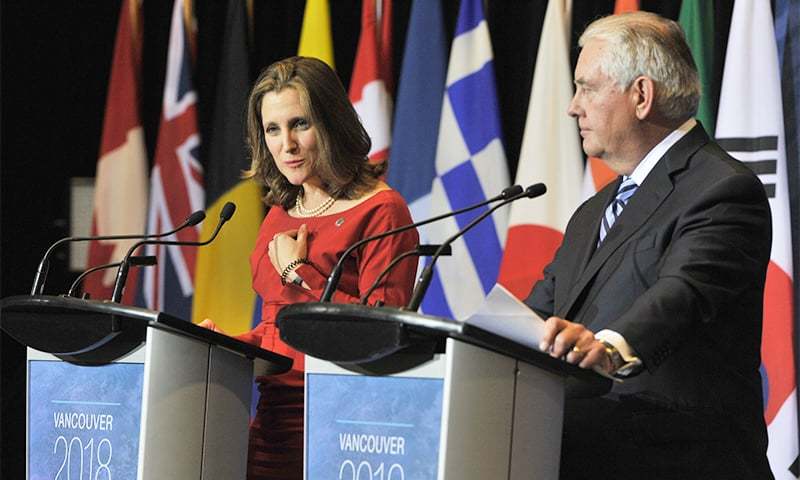U.S., Allies Meet on North Korean Threat, But Ignore China, Russia But Trump Calls Putin Directly Keeping Discourse Open With China & Russia (Why Zionists Want Him Out)
VANCOUVER: Allied world powers met on Tuesday for crisis talks on the North Korean nuclear missile threat, but without key player China, there seemed little chance of a breakthrough.
Canada and the United States are hosting a two-day meeting in Vancouver to bolster solidarity in the face of Kim Jong-Un’s regime. But neither China — the North’s main ally and sole significant trade partner — nor Russia were invited for the ministerial-level talks, limiting the scope for effective new initiatives.
“The most important relevant parties of the Korean peninsula issue haven’t taken part in the meeting so I don’t think the meeting is legal or representative,” Chinese foreign ministry spokesman Lu Kang told a regular briefing.
Lu denounced the “Cold War mentality” of “relevant parties,” without naming the United States, which is urging Beijing to cut off fuel oil supplies to Pyongyang to force it to negotiate its own nuclear disarmament.
With China absent from Vancouver, US President Donald Trump spoke with his counterpart Xi Jinping.
According to the White House, the pair expressed hope that a recent resumption in face-to-face talks between North and South Korea “might prompt a change in North Korea’s destructive behaviour.” But Trump also “committed to sustain the United States-led global campaign of maximum pressure to compel North Korea to commit to denuclearisation.”
Trans-Pacific tensions have been running high for months, despite the recent return to direct talks between Kim’s regime and Moon Jae-In’s South Korea.
Over the weekend, a false alarm in Hawaii warning of an incoming ballistic missile rattled nerves, and earlier this month, Trump and Kim traded saber-rattling bluster.
As the talks got underway, Pyongyang issued its first response to Trump’s argument that his nuclear arsenal dwarfs the North’s fledgling missile batteries.
The so-called Vancouver Group represents 20 countries that sent troops or support to the UN-backed side in the 1950-53 Korean War.
Published in Dawn, January 17th, 2018
What Fake Media Isn’t Telling You:
NEW WORLD ECONOMIC ORDER
Xi and Trump Speak on Momentum on the Korean Peninsula and Greater China-U.S. Cooperation
Jan. 16 (EIRNS)—U.S. President Donald Trump and China’s President Xi Jinping spoke by phone today, where they discussed the situation on the Korean Peninsula, and more cooperation between their own nations, including on trade and economic affairs. No read-out was provided yet by the White House, but China Daily reported on the substance on the call.
On the positive developments of the two Koreas holding talks, Xi said that the momentum is hard-won, and, as reported, “It is vital for the international community to stay united over the issue.” Xi said that China stands ready to continue working with the U.S. on this, towards a proper solution. Trump responded with appreciation of China’s significant role in resolving the Korean Peninsula problem, and expressed his willingness to strengthen coordination with China on the matter.
This point, and the timing of the Trump-Xi call is especially significant, given the meeting today of the “Vancouver Group” on the Korean Peninsula, which conspicuously excludes China and Russia.
In his other points on the phone call, reported by China Daily, Xi said that there should be economic and trade cooperation towards, “making the cake of cooperation bigger.”
On relations with the U.S., Xi expounded on their significance and how they should be expanded. CCTV quoted Xi as saying, “China and the U.S. should keep their exchanges at all levels, fully utilize the four high-level dialogue mechanisms and hold second-round talks when appropriate.”
Xi identified certain sectors important for advancing relations between the two nations. According to China Daily, these are: “cooperation between the two militaries, in law-enforcement, drug control, cultural and people-to-people exchanges and cooperation on local levels, as well as close communication and coordination on major international and regional issues.”
Trump affirmed that the U.S. holds its relations with China in great importance, and is willing to “enhance bilateral exchanges at all levels, expand pragmatic cooperation, and properly handle problems in bilateral trade, so as to achieve even greater results in bilateral relations.”
Overall, Xi said that China-U.S. relations have been stable, and achieved significant progress in 2017. He did single out contingencies, including that, “The two sides need to meet each other halfway…[and] respect each other’s core interests.”















